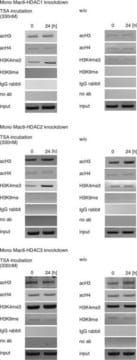05-1248
Anti-monomethyl Histone H3 (Lys9) Antibody, clone CMA306
clone CMA306, from mouse
Synonym(s):
H3K9me1, Histone H3 (mono methyl K9), H3-K9-HMTase 1, Histone H3-K9 methyltransferase 1, Lysine N-methyltransferase 1A, Position-effect variegation 3-9 homolog, Su(var)3-9 homolog 1, Suppressor of variegation 3-9 homolog 1, histone-lysine N-methyltransfe
About This Item
Recommended Products
biological source
mouse
Quality Level
antibody form
purified immunoglobulin
antibody product type
primary antibodies
clone
CMA306, monoclonal
species reactivity
human
technique(s)
inhibition assay: suitable (peptide)
western blot: suitable
isotype
IgG2a
NCBI accession no.
UniProt accession no.
shipped in
wet ice
target post-translational modification
monomethylation (Lys9)
Gene Information
human ... H3C1(8350)
Related Categories
General description
Specificity
Immunogen
Application
Peptide Inhibition: Representative lot data. Specificity confirmed by the ability of immunizing peptide to abolish detection of monomethyl Histone H3 (Lys9) (Lane 7) in western blot analysis of HeLa acid extracts and various other modified histone peptides.
Epigenetics & Nuclear Function
Histones
Quality
Western Blot Analysis: 1 µg/mL of this antibody detected Histone H3 in 500 ng of recombinant Histone H3 and 10 µg of HeLa acid extract.
Target description
Physical form
Storage and Stability
Analysis Note
Recombinant Histone H3 and HeLa acid extract.
Other Notes
Disclaimer
Not finding the right product?
Try our Product Selector Tool.
Storage Class Code
10 - Combustible liquids
WGK
WGK 2
Flash Point(F)
Not applicable
Flash Point(C)
Not applicable
Certificates of Analysis (COA)
Search for Certificates of Analysis (COA) by entering the products Lot/Batch Number. Lot and Batch Numbers can be found on a product’s label following the words ‘Lot’ or ‘Batch’.
Already Own This Product?
Find documentation for the products that you have recently purchased in the Document Library.
Our team of scientists has experience in all areas of research including Life Science, Material Science, Chemical Synthesis, Chromatography, Analytical and many others.
Contact Technical Service








